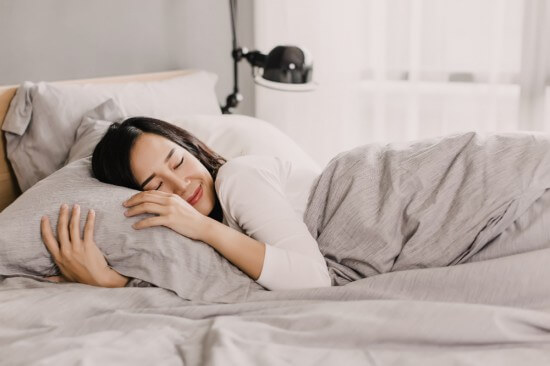Missing a peaceful Sleep? Learn the art of Sleeping
By Prapoorna M
Last Updated: November 26, 2021
Sleep is a distinct state of mind and body being deeply at rest. It is during sleep that the metabolism is lowered and the mind becomes unconscious the external world. We spend almost a third of our lives sleeping, because it serves an important purpose. Sleep recharges our run-down bodies and allows us to recover from physical and mental fatigue. We need sleep to function at our best.
Sleep is not just a simple period of unconsciousness. We go through a cycle of stages from lighter to deeper (stages 1-4) and dreaming (REM) sleep throughout the night in approximately 90 minutes of sleep. In the same way, brief awakenings during the night are normal. Everyone has periods in their life when they don’t sleep well (some people worry about that and focus on it more than others). Need for sleep varies from person to person. Some need more than adults. Most adolescents go through a period when their brain wants to wake up late and go to sleep late and it needs to over-ride that and be patient.

It becomes hard to function actively during the day when someone has a disturbed sleep at night. It raises the risk of problems with how a child behaves and learns. Over 90% of adolescent children don’t get the recommended amount of sleep on school nights. Quality of sleep acts as revitalization of mind and body enabling us to function at peak levels during our waking hours. Getting enough good-quality sleep is important during this period, because sleep is vital for thinking, learning and concentration skills. Good-quality sleep helps to concentrate, remember things and behave well. These all help to be a successful learner. Poor sleep, or not enough sleep, affects concentration, memory and behavior, making it harder to learn. Children who don’t sleep well are more likely to feel sleepy and to have difficulties with learning.
Sleepy children tend to have more problems with behaviour at preschool or school and at home too! For example, a sleepy child might play up in class or unable to follow the teacher’s instructions. A sleepy child might miss out on learning and might also miss out on playing with other children if they don’t like the way he’s behaving.
Research shows that the hour before sleep is crucial so children/adolescents need close to an hour to relax their brains and body. Plan the evening activities including homework around stopping everything an hour before sleep time. That means no homework and no games; no movies and most certainly no social media access in the hour before bed. Reading is the most obvious activity, in a quiet and not-too-light environment. A quiet talk can help some children. Avoid violent TV shows before bed. Surround yourself that cultivate your peace of mind while you fall asleep.
This bedtime routine is important to get your child ready for sleep, especially, after a busy day at school. The human body will restore sleep functioning through its own self-regulation when it is ready. So give your brain the best opportunity to be ready for sleep.
Follow sleep hygiene
‘Sleep hygiene’ is creating the right environment to sleep. It includes the creating habits and patterns so that your body and brain shall expect to sleep, when in bed. If you can do the following strictly for three weeks, it will be effective. After that, you don’t need to be so strict.
Before bed
Waking up early in the morning and exercising regularly each day, preferably in the morning, having good exposure to outdoor light are all necessary things to do. There is good evidence that regular exercise improves restful sleep. Use some de-stressing strategies about an hour before bed. Use soothing music. Choose a book with pictures of a place where you can imagine (try to avoid dark or scary pictures). See it in your mind. Use your imagination to change the picture or add to it. The more you create pictures in your mind, the more it can help to relax.
Write a to-do list for tomorrow so your mind does not have to remember or you need not talk to your parent about the things, which means, your mind does not have to process that in the night. Tell your mind that it is okay to let go of all worries for the next 10 hours. Put some helpful thoughts in your head especially accepting that sleep is never perfect and it will come when it is ready. If you are going to be thinking of something, think of your fondest memories. Think of those thoughts instead of ones that cause you worry and anxiety. Don’t worry about sleep, but accept that sleep is different every night and that is okay.
In Bed
Keep the bedroom quiet, dark enough/dimly lit and quiet enough to help sleep. Keep the temperature in your bedroom comfortable. Go to bed at the same time and get up at the same time every day which is very important.
Don’t engage in stimulating activity in bed such as exercise, competitive game, using a computer, watching exciting TV, or having a difficult discussion. Use your bed only for sleep. If you do homework in bed, your brain will associate bed with work and be wakeful there. If you watch movies or play e-games in bed, then your brain will associate bed with being entertained and be wakeful there. Don’t go to bed too hungry or too full and don’t command yourself to go to sleep, this only makes your mind and body more alert.

Sleeping and Waking
Close the day with mindfulness. Be mindful of whatever preparations you may make before going to bed. Feel the preparations you are making while arranging the bed. Be especially mindful of the act, as you finally lay your body down. This act signifies your intention to sleep which is your last act of closure for the day. So note the intention to lie down and then lie down mindfully, aware of the body lowering itself onto the bed and the head as it touches the pillow. So after having lain down mindfully, you can continue to be mindful of your state of mind and body.
You can know the sensations in the contact between your body and mattress and your head and pillow. You can know your breath as you breathe in and out or you can know the rising and falling of the abdomen, which occur as you inhale and exhale. Be aware of your mind and the thoughts that arise. Try to stop your thinking and planning. Allow yourself to drift into sleep. If you toss about in bed or intend to turn from one side to another, do all this mindfully, noting your intention to turn and then turn. Observe everything like touching, tugging, and switching off the light.
Thoughts that occur can be like
- How have I lived this day?
- Have I loved?
- Have I cared?
- Have I been kind & generous & mindful?
- Have I learnt to be able to let go?
Ah, tomorrow will be another day. May all beings be happy!!
Next morning
Again just as you close the day with mindfulness, you must begin it with mindfulness, too. It is important to wake up in a good state of mind. Be aware that you have awakened even before you open your eyes. Then open your eyes mindfully, noting even the intention to open the eyes before you open them. This may be rather difficult, that is, to be mindful even before you open the eyes, catching the awakening moment, but it is rather challenging and interesting, isn’t it?
Be alert and mindful at the moment of awakening. Switch off the alarm. Open your eyes. Just feel the day, saying, “Oh, what a beautiful morning!” Welcome another day of opportunities for cultivating good thoughts, for learning the lessons of our lives of appreciation and understanding and letting go.
If you have already opened your eyes, and you couldn’t catch that awakening moment, it is okay and you can still be mindful. Notice your state of mind. Are you fresh, alert, awake, or are you still sleepy and wanting to sleep some more?
If you still desire to linger in bed and turn from one side to another, not wanting to get up and you know that you have to get up, try to summon that intention to get up mindfully, and get up with as much awareness as you can. Then go about what you have to do mindfully, walking to the bathroom door, opening the door, and being mindful of all the activities that follow uncapping the tooth paste, squeezing the paste onto the toothbrush, brushing your teeth, rinsing your mouth, soaping and washing your face, wiping it with the towel, and so on.
Then be mindful of all the activities you do like walking back to your bed, folding your blanket, making your bed, and so on. It feels good to do an hour of sitting to meditate after you have washed your face. If not, a span of about 45 minutes or half an hour would also have its effect. Meditation helps you to be more composed for the rest of the day. It is really good to meditate for some time after you get back from work, as it helps to clean or purify the mind after a day of activity. To practice mindfulness and the activities related, to have an expert’s advice on how to deal with stress and anxiety and the unhelpful thoughts that block your way, book an appointment, today.
Book your Free Consultation Today
Parent/Caregiver Info:
Client’s Details:
* Error Message









